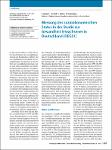Messung des sozioökonomischen Status in der Studie zur Gesundheit Erwachsener in Deutschland (DEGS1)
Lampert, Thomas
Kroll, Lars Eric
Müters, Stephan
Stolzenberg, Heribert
Der sozioökonomische Status (SES) stellt eine zentrale Analysekategorie der epidemiologischen Forschung und Gesundheitsberichterstattung dar. Im Rahmen der Deutschen Herz-Kreislauf-Präventionsstudie 1984–1991 wurde zur Messung des SES ein mehrdimensionaler aggregierter Index entwickelt, der bis heute in vielen Studien verwendet wird. Für das Gesundheitsmonitoring am Robert Koch-Institut (RKI) wurde der Index nach einer kritischen Überprüfung grundlegend überarbeitet. Der Beitrag beschreibt, welche Überlegungen der Überarbeitung zugrunde lagen und wie diese in Bezug auf die „Studie zur Gesundheit Erwachsener in Deutschland“ (DEGS1) umgesetzt wurden. Zudem werden Ergebnisse zur alters- und geschlechtsspezifischen Verteilung der Werte des überarbeiteten SES-Index und zum Zusammenhang mit anderen Maßen des sozioökonomischen Status berichtet. Die Ergebnisse basieren auf den Daten von DEGS1 2012 und des Bundes-Gesundheitssurveys 1998 (BGS98). Socioeconomic status (SES) constitutes a central analysis category of epidemiological research and health reporting. As part of the German Cardiovascular Disease Prevention Study 1984–1991, a multi-dimensional aggregated index was developed for the purpose of measuring SES. This index continues to be used in numerous studies to this day. For the purpose of health monitoring at the Robert Koch Institute (RKI), the index was fundamentally revised following critical assessment. This article describes the basic concepts underlying the revision and how they were implemented in relation to the German Health Interview and Examination Survey for Adults (DEGS1). In addition, the results of the age and sex-specific distribution of the values of the revised SES index and those relating to the connection with other measurements of socioeconomic status are reported. The results are based on the data of DEGS1 2012 and the German national health interview and examination survey 1998 (GNHIES98). An English full-text version of this article is available at SpringerLink as supplemental.
No license information

